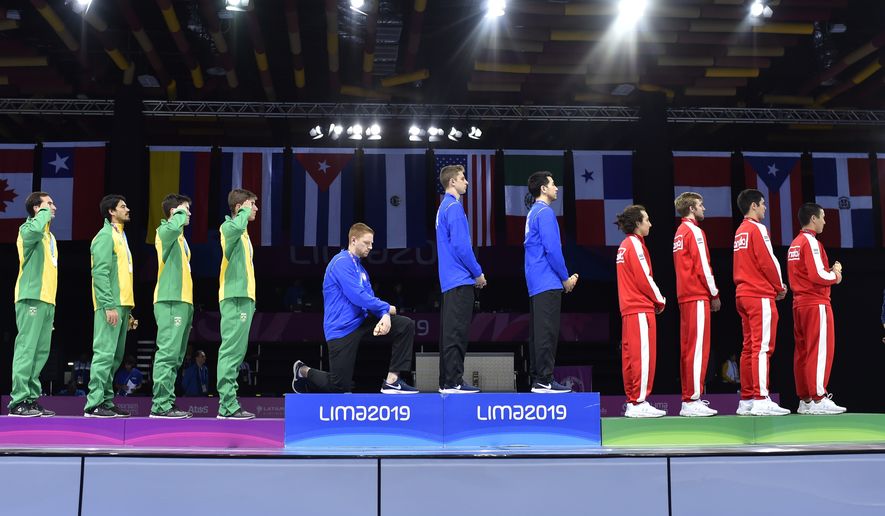Apolitical sports coverage doesn’t mix with social justice activism

By DERON SNYDER (as published in The Washington Times)
“That was a very patriotic thing (Colin Kaepernick) did.” – USA Basketball coach Gregg Popovich on Tuesday.
“Frankly, I’d love to see Kaepernick come in, if he’s good enough.” – President Donald Trump on Aug. 9.
“Without question, our data tells us fans do not want us to cover politics.” – ESPN president Jimmy Pitaro, March 2018.
Pitaro and many fans might want ESPN to avert its glance when sports and politics intersect. On the surface, that seems like a perfectly reasonable stance. Syndicated columnist Norman Chad recently wrote that the position is analogous to Disney Channel and its fans not wanting commentary on news, just “magical kingdoms, fairy-tale stories and a fantasy world of delight.”
That works well when the content is based on Snow White, Mickey Mouse and fictitious characters in sitcoms and movies. But real-life human beings like Kaepernick, Popovich and Trump – and now, U.S. fencer Race Imboden and hammer thrower Gwen Berry – have a way of slipping reality into our discussions about fun & games.
When that happens, it’s news, not make-believe. And credible news organizations should cover it as such.
Imboden knelt on the podium during the national anthem last week after winning a gold medal in team foil at the Pan American Games. Teammates Gerek Meinhardt and Nick Itkin remained standing during the ceremony, which took place several days after mass shootings in Texas and Ohio.
“Racism, Gun Control, mistreatment of immigrants, and a president who spreads hate are at the top of a long list,” Imboden wrote in a series of tweets about his decision. “I chose to [sacrifice] my moment today at the top of the podium to call attention to issues that I believe need to be addressed. I encourage others to please use your platforms for empowerment and change.”
The next day, Berry bowed her head and raised her right fist as the anthem played after she won a gold medal.
“Just a testament to everything I’ve been through in the past year and everything the country has been through this year,” Berry told NBC Sports. “A lot of things need to be done and said and changed. I’m not trying to start a political war or act like I’m miss-know-it-all or anything like that. I just know America can do better.”
Some sports fans condemn kneeling and/or raising fists during the national anthem because they believe such acts are wrong, any time and any place. Other fans oppose because they believe protests shouldn’t be connected to sports. Yet another segment couldn’t care less, the only concern being what takes place each game.
Here’s the thing for Pitaro and like-minded types who fret over sports and politics mixing: Fans in each aforementioned category can consider themselves “patriots” (even though the first group tries to warp the definition for its own use).
The major pro sports leagues love to wrap themselves in the flag, positioning themselves as emblems of national strength, pride and achievement. More than ever, that’s a political act. The U.S. Olympic Committee, by its very nature, has always been political, supporting Jesse Owens’ triumphs against the Nazis and Team USA’s Cold War battles against Russia.
Ask athletes and coaches to keep their politics to themselves, and most comply.
But a few refuse, believing their message merits delivery from sports’ platform. They believe it’s more important to talk about things that make some people uncomfortable, and more dangerous to leave those things left unsaid.
“Patriotism means a lot of things to different people,” Popovich told reporters Tuesday after a U.S. team practice in Los Angeles. “There’s people who are truly committed in that sense and people who are fake. … Because someone hugs a flag doesn’t mean they’re patriotic. Being a patriot is somebody that respects their country and understands that the best thing about our country is that we have the ability to fix things that have not come to fruition for a lot of people so far.”
Imboden and Berry violated the rule that prohibits U.S. athletes from “demonstrations that are political in nature,” according to USOPC statement. Officials are reviewing possible consequences, which could include expulsion from the team headed to the 2020 Summer Olympics in Tokyo.
If Trump really wants Kaepernick to be judged on his athleticism and not his activism, the same should apply to prospective Olympians, too, whether they demonstrate their dissent by taking a knee, raising a fist or grabbing a microphone.
In sports, like the rest of real life, protests can go uncovered and protesters can be blackballed. The games will continue.
But so will the issues and the activists.
— Brooklyn-born and Howard-educated, Deron Snyder writes his award-winning column for The Washington Times on Tuesdays and Thursdays. Follow him on Twitter @DeronSnyder.
 Follow
Follow
